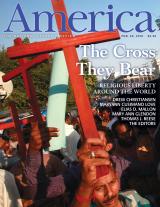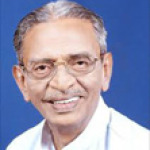Religious freedom today

All talk, no Practice
Editorial in America,National catholic review, Feb.29/16 issue EDITORIAL
 (Note: Theoretically all pay lip service to freedom of religion, but how many practice it? This is what the American Jesuit weekly analyzes below. Rationally speaking, there should be only one religion, since there can be only one God, granting there is a God, to pay respect to unbelievers. In that sense Sri Narayana Guru alone is right when he argued for “One God, one Religion, one Caste, human caste.” Now what we have instead is: “Man created religions, religions created gods, and religions and Gods confabulated and divided this mother earth into various fiefdoms, they divided human minds as well,” as Vayalar Ramavarma, Kerala’s renowned thinker and poet wrote. Just think of the US the oldest democracy, called the land of the free, home of the bold and city seated on a mountain top! Just listen to the rumblings of hot lava of Islamaphobia tumbling from the mouth of its top Republican Candidate Donald Trump. Look at our own country that prides itself as the largest democracy and cradle of all world religions, busy with implementing anticonversion bills passed in many states and the RSS the present government’s political mentor, busy with “Khar Vapsi”—bringing home Hindus fallen off from the fold. The editorial takes swipe at the leader nation Saudi Arabia, in the Islamic world and a very close ally of US due to its vested interest in it oil wealth, which is said to be the worst example of religious freedom. One thinkig alone can be acceptable to all — to allow all to be led by one light, called reason, failing which to enforce the teachings of Sri Narayana Guru. james kottoor, editor)
(Note: Theoretically all pay lip service to freedom of religion, but how many practice it? This is what the American Jesuit weekly analyzes below. Rationally speaking, there should be only one religion, since there can be only one God, granting there is a God, to pay respect to unbelievers. In that sense Sri Narayana Guru alone is right when he argued for “One God, one Religion, one Caste, human caste.” Now what we have instead is: “Man created religions, religions created gods, and religions and Gods confabulated and divided this mother earth into various fiefdoms, they divided human minds as well,” as Vayalar Ramavarma, Kerala’s renowned thinker and poet wrote. Just think of the US the oldest democracy, called the land of the free, home of the bold and city seated on a mountain top! Just listen to the rumblings of hot lava of Islamaphobia tumbling from the mouth of its top Republican Candidate Donald Trump. Look at our own country that prides itself as the largest democracy and cradle of all world religions, busy with implementing anticonversion bills passed in many states and the RSS the present government’s political mentor, busy with “Khar Vapsi”—bringing home Hindus fallen off from the fold. The editorial takes swipe at the leader nation Saudi Arabia, in the Islamic world and a very close ally of US due to its vested interest in it oil wealth, which is said to be the worst example of religious freedom. One thinkig alone can be acceptable to all — to allow all to be led by one light, called reason, failing which to enforce the teachings of Sri Narayana Guru. james kottoor, editor)
 The state of religious liberty in the world today is an urgent and complex subject that cannot be summarized in a single editorial or essay. As Elias D. Mallon, S.A., notes in this issue, the sheer number of reports detailing violations of religious freedom is daunting. Yet few issues are more worthy of a believer’s attention. We should be thankful that the agencies dedicated to documenting these abuses are so robust and vigilant.
The state of religious liberty in the world today is an urgent and complex subject that cannot be summarized in a single editorial or essay. As Elias D. Mallon, S.A., notes in this issue, the sheer number of reports detailing violations of religious freedom is daunting. Yet few issues are more worthy of a believer’s attention. We should be thankful that the agencies dedicated to documenting these abuses are so robust and vigilant.
Moving from documenting these violations to correcting them represents a Herculean task. Religious divides in some countries have festered for centuries and may take just as long to heal. The United States enjoys a long tradition of religious freedom, of which we are justly proud. Because of it, we have a unique responsibility to argue for the importance of religious freedom on the international stage. It is our duty to convince our allies around the world, through intense and sustained diplomatic efforts at the highest levels, that religious freedom is not a special privilege reserved for members of democratic societies. It is a fundamental human right that must be at the center of the social contract between a government and its citizens.
One U.S. ally that deserves special attention is Saudi Arabia, a country with deep economic and security ties to Washington. Conversion from Islam is a crime punishable by death in the kingdom, and alleged apostates are often subject to brutal torture. Christians, meanwhile, most of whom are foreign workers without citizenship, are not allowed to worship in public. These and other violations of religious liberty have been a source of concern for U.S. leaders for some time, and a report in 2006 aimed at holding Saudi leaders accountable remains a useful yardstick for progress. But reform has been slow to come, and as James Zogby notes in a report from the U.S. Commission on International Religious Freedom in 2015, a more thorough revisiting of the 2006 report is necessary.
Unlike Saudi Arabia, India is not a theocratic state and is home to a diverse religious community and a tradition of secular leadership. Yet minority religious communities have not fared well in the majority-Hindu country, and the country’s current prime minister, Narendra Modi, has a checkered history with the country’s Muslim minority. Since the Bharatiya Janata Party took power in 2014, India has seen a worrying increase in the number of religiously motivated attacks against Muslims, Christians and Sikhs. Meanwhile, a number of Indian states have anticonversion laws on their books. President Obama has urged India to pay greater attention to these issues, but more formal diplomatic engagement is required. Since 2009, the United States and India have engaged in five “strategic dialogues” on various questions including trade, education, technology and gender. Religious freedom should be added to the agenda of the next meeting.
The U.S. State Department maintains a list of countries whose antireligious record merits “particular concern.”Pakistan is not currently on that list, but perhaps it should be given its poor record of protecting believers. The Pakistani Supreme Court tried to address the issue in 2014 by calling for the creation of police forces to protect minority communities, but the government has failed to follow through. The country’s blasphemy laws, which are vaguely defined, have been used to target Christians and Muslims and can result in severe sentences. With the U.S. troop withdrawal from Afghanistan, the United States may not have as much sway in Pakistan as it once did, but the two countries share strategic interests, and U.S. leaders should argue strongly for the repeal of the country’s egregious blasphemy laws. This will be a difficult task, as Pakistan remains a vocal opponent of expanded religious freedom on the international stage.
Many other allies could be added to this brief list. Turkey routinely interferes in the affairs of religious communities by, for example, restricting the ability of religious communities to train priests. In Egypt, President Abdel Fattah el-Sisi has pledged greater tolerance for religious diversity, but Coptic Christians remain a target of violence, and blasphemy laws are still enforced. To maintain pressure on these countries to change, support is needed from both U.S. and international leaders. Congress should hold annual hearings on the implementation of the International Religious Freedom Act, and the United Nations could supplement its special rapporteur on freedom of religion or belief with special rapporteurs assigned to some of the worst offending countries.
Religious liberty is not just another special cause lobbying for the attention of government leaders. It is a matter of essential human dignity that deserves our respect, our protection and, if necessary, all the economic and diplomatic influence a nation like the United States has at its command.
**********************************
















